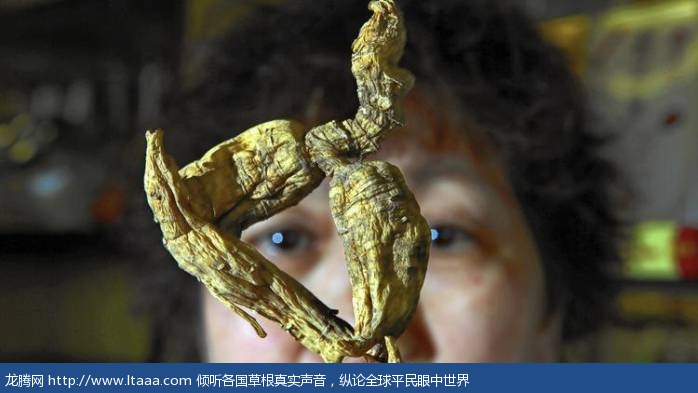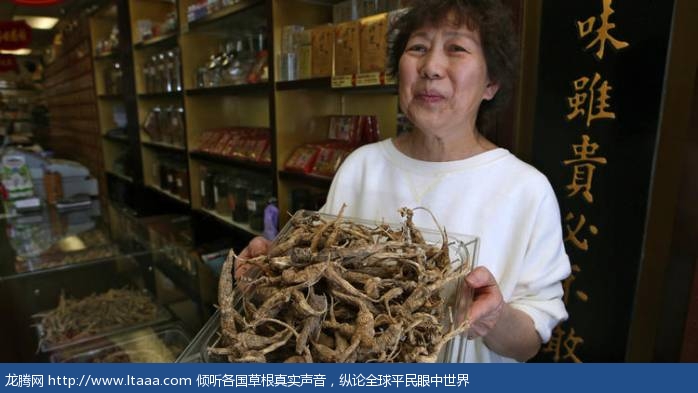中国人是美国花旗参的忠实铁粉 [美国媒体]
当人参被贴上了“100%美国产”的标签,便可跻身中国最受欢迎的节日礼物之列。很多顾客喜欢美国产的西洋参参更甚于中国产的。去年,美国出口了7730万美元的参根。绝大部分销往香港,并且售价远高于其他农产品。
American ginseng has a loyal Chinese clientele
中国人对美国花旗参情有独钟
One of the most popular holiday gifts in China is ginseng, stamped with an unusual guarantee: 100% American.
当人参被贴上了“100%美国产”的标签,便可跻身中国最受欢迎的节日礼物之列。
Few consumers are more faithful to American products than Chinese users of ginseng: the U.S. exported $77.3 million in ginseng roots last year, most of it to Hong Kong, and American ginseng fetches the highest price of any cultivated variety.
很多顾客喜欢美国产的西洋参参更甚于中国产的。去年,美国出口了7730万美元的参根。绝大部分销往香港,并且售价远高于其他农产品。
The Asian market prizes the American strain for its stronger flavor and high levels of the active ingredient that is said to unlock the root's myriad but unproven health benefits.
之所以在亚洲市场大受欢迎,是因为人们认为美产西洋参味道更重,并且有很高含量的活性物质,这些活性物质有数不清的未经证实的养生功效。
The other part of the U.S.' competitive advantage is favorable feng shui. Ginseng grown in North America is said to have a "cool" nature and calming effect, which means it can be taken daily; Asian ginseng is considered "hot" and must be consumed in limited quantities.
美国西洋参的另一个优势与风水有关。因为西洋参种植地在美国北部,因此是“凉”的属性,可以天天吃;而中国人参被认为是“热”的属性,因此吃的时候要严格控制食用频率和分量。
American ginseng is cheaper in the U.S. than in China. In the San Gabriel Valley, herbal stores cluster on streets near hotels popular with tourists, their shelves loaded with red boxes covered in quality seals and branded with American flags.
西洋参在美国卖得比在中国要便宜。在San Gabriel Valley,人来人往的酒店旁周边街道上有很多草药店,出售印着美国国旗、包装精美的红色盒装西洋参。
图为崔珍妮拿着产自美国的花旗参参根。参根越粗,口感越细腻,价格也就越贵,要几百美元。
But an American flag is no guarantee of American authenticity, said Tom Hack, international marketing director for the Ginseng Board of Wisconsin, where he says up 95% of the U.S. crop is grown.
但农业大省威斯康辛州的人参国际市场经理Tom Hack却说,西洋参盒上印的美国国旗并不是产自美国的保障。
In a recent survey at an Asian food expo in Southern California, the board found that less than 12% of ginseng products labeled as Wisconsin ginseng actually came from Wisconsin.
最近的调查显示,从南加州出口到亚洲的标有“威斯康辛西洋参”的货品中,只有不到12%是真正产自威斯康辛的。
Hack says American ginseng purchased in America is more likely to be Canadian, or....Chances are, he said, the Chinese tourists "are taking Chinese-raised 'American ginseng' back with them."
Tom Hack说,大多数“美国西洋参”的货源是加拿大甚至……“有时根本就是从中国进口过来的,又被中国游客当做美国产的买回去,带回中国。”
At Chung Chou City in San Gabriel, the heavy scent of dried herbs and seafood fills the air as an elderly customer sinks his hand into a barrel of sliced ginseng root. Manager Jeff Lin hurries over.
"Man man kan," he says encouragingly. Take your time.
在加州San Gabriel的Chung Chou市,空气中充满了浓重的干草药和海产品的味道,一位上了年纪的顾客正在挑选参根片。店铺经理林杰夫赶忙上前招呼道:“慢慢看。”意思是让顾客不必在意时间,尽情挑选。
Ginseng is a boom-or-bust business, Lin said; sales jump when plane tickets are cheap and tourists from the Hilton hotel across the street are plentiful. Lin has noticed a slight increase before breaks in the school year, when Chinese students studying in the U.S. buy boxes to take home to their families. Ginseng is an especially prestigious gift to give for Christmas, Lin said.
林杰夫注意到每当学校即将放长假,西洋参销量就会上升。这是由于大批留学生在放假前购买参礼盒寄回家,或者当做特别的高档礼物相互赠送。
Raw ginseng is available in several 60-pound barrels at the front of the store, but Chung Chou City also offers ginseng whole, chopped, powdered, in pills, or as candy or tea. Thick roots are more valuable, and smooth, unblemished roots cost hundreds of dollars more. Wild, foraged ginseng commands the highest price, but American-grown ginseng is the most popular, Lin said.
在草药店前,能看到大约60磅(54斤)的一堆未经加工的西洋参。在Chung Chou市,你还能找到切片的、打成粉状的、做成片剂的的等等各种各样的参商品,甚至还有参糖和参茶。越粗的参根越贵重,口感也更为细腻,价格可达几百美元以上。虽然野生参被认为是最为高级的,价格最高,但是美国产的西洋参却是最流行的。
Stores eagerly display their Wisconsin credentials. At Ten Ren Tea and Ginseng in Monterey Park, a gold-plated plaque with the words "Wisconsin Ginseng Export License" hangs over the counter. Other stores offer glossy pamphlets describing company-owned-and-operated ginseng farms in Wisconsin.
店铺争相挂出他们的“威斯康辛质量保证”。在Monterey Park一家名为“Ten Ren Tea and Ginseng”的店面上,一枚金色匾额高高挂起,上书“威斯康辛参出口许可证”。其他店铺还提供印制精美的小册子,上面详细介绍了公司化种植经营的威斯康辛农场。
It's a highly profitable industry in which even a few small sales can put a store in the black. At one store, the most expensive roots were selling for up to $9,000 a pound.
这门生意利润之高,甚至在一些偏僻的角落都有参店开张营业。在一家店中,最昂贵的参根价格高达9000美元1磅(450g)。
The lucrative root even spurred a 2012 crime spree in Monterey Park.
2012年的时候,Monterey Park甚至发生了团伙偷窃连环案,目标就是这些价值千金的植物根。
The thief would sprint into a store, seize a container of ginseng or sea cucumber and then jump into a waiting black Honda. (The thief and his driver were arrested by Monterey Park police a month later.)
盗窃团伙中有人负责进店偷人参,得手后就从后窗逃出,进入店外接应的黑色丰田车里(这个犯罪团伙一个月后被Monterey Park警方逮捕)。
Around this time in late February, in the days after the Lunar New Year, Wisconsin's ginseng farmers are overrun with orders from Chinese suppliers trying to restock after the holiday rush.
在二月末,中国农历新年之后的那几天中,威斯康辛人参种植园的农民们恨不得彻夜处理来自中国的海量订单。在节前的年货采购中,这些店铺的库存已经被顾客扫光,所以在节后赶紧补货以稳定库存。
Sales have been strong the last few years, and farmers have sold out their whole inventory, said Hack of the Ginseng Board of Wisconsin. In 2013, the board and Beijing-based Tong Ren Tang signed a 10-year, $200-million deal to sell Wisconsin ginseng in China.
Hack介绍说,近年来西洋参抢购风潮愈演愈烈,很多农民的库存都被清空了。在2013年时,北京同仁堂与威斯康辛一举签下了长达十年,价值2亿美金的大订单。
But over the last two decades, Wisconsin farmers have watched their market share sharply decline thanks to ginseng piracy and brand dilution, Hack said.
但同时令Hack忧心的是,市场上层出不穷的冒牌货已经在过去的20年间挤占了市场,使得威斯康辛的参农们只能眼睁睁看着市场份额的不断减小。
As proof, he offers some math. Wisconsin produces about 700,000 pounds of ginseng a year — 95% of the American crop, according to the Ginseng Board. About 80% of that is exported directly to Asia. That leaves roughly 140,000 pounds of genuine Wisconsin ginseng for distribution in the U.S. — a small fraction of U.S. sales.
他当面给记者算了一笔账。威斯康辛每年出产大约700,000磅的西洋参,占到美国总产量的95%。这些产品中的80%都会直接出口到亚洲,仅有140,000磅被分销至美国各地——这些只占美国市场销量的很小一部分。
U.S. ginseng suppliers typically aren't selling Wisconsin-grown ginseng, Hack said, because so little of it is available in the domestic market. The U.S. imports a lot of ginseng for domestic use — about $31.3 million of it in 2014, according to WiserTrade, an research firm that compiles data on U.S. foreign trade.
因此美国的卖家们一般不出售威斯康辛产的西洋参,因为它占得国内市场份额实在太小。美国国内市场上销售的西洋参基本都是进口的,根据市场调研公司WiserTrade的数据显示,美国仅2014年就进口了3130万美元的西洋参。
Some of that imported ginseng could be marketed as Wisconsin-grown, Hack said. A few years ago, Wisconsin ginseng seeds were planted in Canada and China — both among the world's leading ginseng producers.
这些进口的西洋参中,一大部分就被贴上“产自威斯康辛”的标签。多年以前,威斯康辛西洋参的种子被加拿大和中国引进,这两个国家现在是世界上最大的西洋参出口国。
Funded by assessments from ginseng farmers, Wisconsin's Ginseng Board was formed in 1986. In 1991, it trademarked an official seal that would be stamped only on board-verified ginseng products.
实际上,“威斯康辛西洋参”这个品牌创立于1986年。在1991年的时候制定了官方标准,只有通过产地认证的西洋参才能得到这个正品标签。
But the seal was widely pirated, and the board sued several companies for trademark infringement.
但是这个正品标签已经被大量仿冒,光是状告那些冒牌公司的官司就打了好几场。
Today, just seven distributors worldwide are authorized to use the seal. But ginseng suppliers are still counterfeiting American authenticity, Hack said.
如今只有7家国际供货商是真正被威斯康辛西洋参授权了的,而冒牌公司伪造正品标签的行为也一直存在。
In January, Wisconsin Ginseng Board officials flew to Southern California and inspected dozens of Wisconsin-branded ginseng products at the Asian American Expo in Pomona. Hack says less than 12% of the products were actually from Wisconsin.
今年一月份,威斯康辛西洋参协会官方抽查了南加州Pomana出口的西洋参,其中打着“威斯康辛”标牌的只有12%是正品。
Hayward-based Prince of Peace is one of just two authorized distributors of Wisconsin ginseng in the U.S. The company distributes about 80,000 pounds of the product a year, said Billy Poon, general manager of its Asian market division.
总部位于Hayward的和平公主是美国唯二的两家威斯康辛西洋参认证分销商之一。该司亚洲市场部经理Billy Poon介绍说,公司每年销售的西洋参为80000磅。
They package their ginseng in distinctive peach-colored boxes printed with an endorsement from former pro tennis player Michael Chang. But even their packaging has been pirated, Poon said.
他们公司销售的西洋参礼盒都是粉色的,上面印着产品代言人——前网球运动员Michael Chang。但是如今他们公司的包装也已经出现了仿冒品。
Hack declined to comment on whether any lawsuits were pending against Southern California companies, saying only that cease-and-desist letters had been sent based on their findings at the Pomona event.
Hack拒绝透露是否会状告南加州那些盗用“威斯康辛西洋参”标签的公司,只表示向Pomona抽查中违规的公司递送了终止函。
Wisconsin's ginseng industry has shrunk dramatically thanks to plummeting prices, Hack said. At one point, there were 1,500 growers producing 2.2 million pounds of ginseng a year. Today, about 180 growers produce about 700,000 pounds annually.
由于西洋参价格下跌,威斯康辛的参种植业正在快速收缩。曾几何时,威斯康辛有1500个种植园,每年出产220万磅的西洋参,其中180家的年产量就达到了70万磅。
"We don't get a fair shake," said Joe Heil, a Wisconsin farmer who has cultivated ginseng for 22 years. Imported ginseng "is mislabeled, it's snuck in. The Chinese [who] are bringing it in laugh about it."
“我们并没有得到公平的待遇,”威斯康辛参农Joe Heil说,他从事西洋参种植业已经22年了,“进口的西洋参被贴上了威斯康辛的标签,混进市场中。中国人带来了这些冒牌货,还对此一笑而过。”
On Garvey Avenue in Monterey Park, Joe Lin, owner of Chang Le Xin Hui Group, munches on Hainan chicken as he oversees an empty store.
在Monterey Park,长乐星辉公司的拥有者林杰夫正在空荡荡的店铺里大嚼湖南鸡肉饭。
An immigrant from China's Fuzhou province, Lin opened three years ago, and his business has grown slowly. Competition is fierce; within a few blocks of his store, about a dozen others compete for tourist business from the nearby Lincoln Plaza hotel.
三年前,福州移民林杰夫开了这家公司,但是他的事业发展得并不尽乎人意。这里的竞争太激烈了,林肯广场酒店旁的这条街上开着10几家参店,互相抢着做旅客的生意。
Down the street, a box of American-labeled ginseng was going for $10. At the Yuen Fong Sum Yong Trading store in neighboring San Gabriel, the deal was buy one box, get one free.
在这条街上一盒西洋参只要10美元。而在San Gabriel的Yuen Fong Sum Yong商铺里,已经开始买一盒送一盒。
"There are too many ginseng stores," Lin said. "We Chinese people always do this — as soon as something makes money, everyone copies it."
“这里参店太多啦,”林抱怨道,“中国人老是这样,什么生意一开始火,每个人就都要来分一碗羹。”
版权声明
我们致力于传递世界各地老百姓最真实、最直接、最详尽的对中国的看法
【版权与免责声明】如发现内容存在版权问题,烦请提供相关信息发邮件,
我们将及时沟通与处理。本站内容除非来源注明五毛网,否则均为网友转载,涉及言论、版权与本站无关。
本文仅代表作者观点,不代表本站立场。
本文来自网络,如有侵权及时联系本网站。
图文文章RECOMMEND
热门文章HOT NEWS
-
1
Why do most people who have a positive view of China have been to ...
- 2
- 3
- 4
- 5
- 6
- 7
- 8
- 9
- 10
推荐文章HOT NEWS
-
1
Why do most people who have a positive view of China have been to ...
- 2
- 3
- 4
- 5
- 6
- 7
- 8
- 9
- 10












